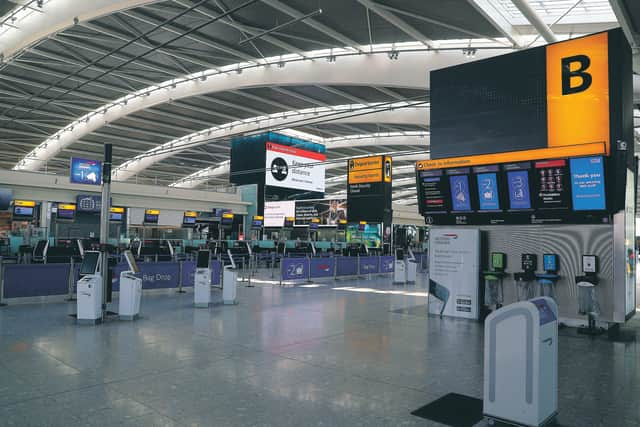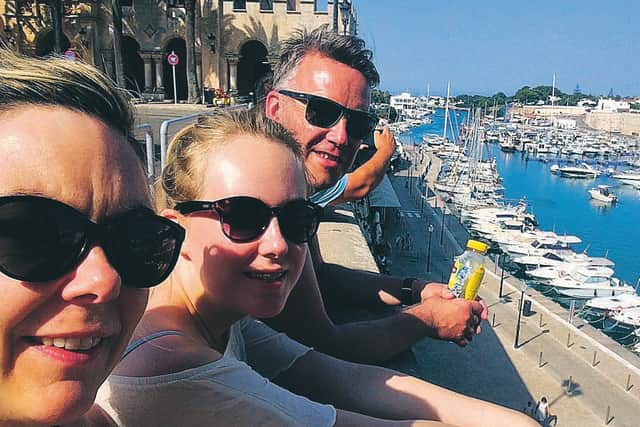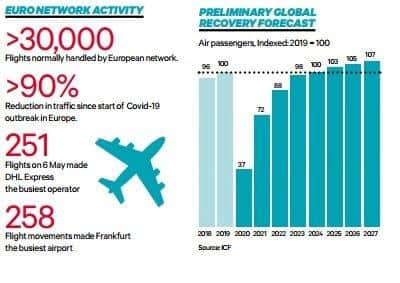Insight: Travel in the time of Covid - a weird world where only brave will fly
BBC Europe correspondent Jean Mackenzie was describing in bewildered tones how flying has completely changed in the age of Covid-19.
“First of all, you’ve got the airport weird. Every shop, every café – all boarded up,” she told the BBC’s Coronavirus Newscast podcast.
Advertisement
Hide AdAdvertisement
Hide Ad“You can’t buy anything, you can’t do anything. All the airport ‘fun’ is over.”


On board, Mackenzie said that while some planes were almost empty, on others she had been shocked to find herself sitting for hours right beside a stranger.
She found even collecting luggage after landing was different. Passengers have to use separate lanes to approach the baggage carousel. “So when you miss your bag and run around to get it – not allowed,” she said. Her verdict: “I can’t see a world in which I would choose to travel like that.”
But passengers may find things have got even worse than Mackenzie’s experience when they are allowed to fly again after virus restrictions are eased.
The “new normal” is expected to mean getting through airports taking significantly longer, with physical distancing being enforced.


Temperature checks, such as those being introduced at Edinburgh and Heathrow, are likely to further slow the process.
There may be compulsory mask or face coverings aboard aircraft, restrictions on movement round the cabin. Planes will be deeper cleaned and more frequently.
Using mobile phones for checking in, dropping bags and boarding passes is likely to be maximised to minimise touching.
Advertisement
Hide AdAdvertisement
Hide AdTechnology could even enable seat backs and tray tables to be moved with remote sensors. Security trays may be sanitised using ultra violet light.


The new normal
However, the World Health Organisation warned against “immunity passports” because there was no evidence people were safe from being infected a second time.
Aviation leaders said it was crucial there were common standards consistently applied across the industry to reassure passengers, such as hygiene and health precautions, which were currently lacking.
AGS Airports, which includes Aberdeen and Glasgow, said: “It’s important there is a coordinated and consistent response when it comes to the measures airports will have to put in place.”


The Airport Operators Association said officials must have the power to deny passengers boarding who did not comply.
But when this “new normal” will happen remains uncertain, with many international borders closed as governments impose varying levels of lockdown as they battle to contain the pandemic. A planned 14-day quarantine period for passengers arriving in the UK adds further doubt.
Covid-19 very rapidly and dramatically changed the aviation landscape. The figures are astonishing – an estimated 4.6 billion fewer passenger trips will be made this year at a loss to the industry of £78 billion, according to Airport Council International. IT firm Sita said the number of bags carried fell from 2.7 million to 35,000 in nine weeks.
Edinburgh Airport, normally Scotland’s busiest, has gone from handling some 250,000 passengers a week to just a few dozen a day.
Advertisement
Hide AdAdvertisement
Hide AdAberdeen has taken its place, thanks to offshore and island flights, and remarkably, was Europe’s 32nd busiest airport last week, ahead of the likes of Geneva, Budapest and Lisbon.
Meantime, Glasgow-based Loganair, which is providing essential flights to the Northern and Western Isles, is currently the continent’s 17th busiest airline, operating more flights than giants Air France and Ryanair – albeit only 48 a day.
The downturn has already brought casualties, with Flybe collapsing in March and CityJet in difficulties. Long-haul airlines are particularly feeling the pain, with British Airways warning of up to 12,000 job losses and Virgin Atlantic 3,150.
But cargo carriers are benefitting from the crisis, with DHL Express flying more times in Europe than even the largest passenger operators.
‘Hot-footing across the world may not be practical any more’
Scots who have had their summer holiday plans ruined have given a mixed response to the prospect of being able to travel again.
Pamela Moffat decided on Friday to cancel her family’s annual trip to Menorca in July because of the uncertainty, losing their £180 deposit. The 45-year-old Edinburgh designer and dog trainer said: “We discussed it and decided that due to the fact nothing has changed as far as the virus is concerned – there’s no treatment or vaccine – how could the holiday possibly go ahead as planned?
“Even if we could travel abroad, we would still be at risk of catching or spreading the virus.
Advertisement
Hide AdAdvertisement
Hide Ad“My husband Iain is really disappointed because it’s his main opportunity to relax from his busy job. Our 15-year-old daughter Orla thinks it’s a bad situation to have to be in, but understands why it has to happen.”
Jacob Farr, 26, a journalist in Edinburgh who had been due to travel with friends to the Euro 2020 football championships in Budapest in June, thought the virus could permanently change travel.
He said: “At the moment, Wizz Air say our flight is still going ahead, but the Euros are cancelled and there is not a chance I’ll be risking going abroad this year.
“I have asthma and high-risk family members close to me – not to mention the fact I do not fancy being hospitalised abroad during a pandemic.
“Our generation simply has to realise that hot-footing across the world may not be practical any more. But that could be difficult as we are a generation who have only known cheap weekends to Europe with friends. Nothing will be the same again.”
Robyn Pender, also 26, who was due to have been returning to Glasgow from a two-and-a-half week trip to Vietnam with her boyfriend Warwick tomorrow, was also cautious. Pender, who works for a power company, said: “It is unclear when normal travel will resume, never mind international travel.
“We are now potentially looking at dates later in the year, possibly November. However, this all depends what the state of play is at that time.
“I’d like to think we would be in a position further down the line when we could plan for the same, if not similar adventure. However, being mindful not to get stuck anywhere if the situation worsens again.”
Advertisement
Hide AdAdvertisement
Hide AdVeteran traveller Susan Dick, 63, who had three trips booked when the pandemic struck, is optimistic.
The retired teacher from Gullane in East Lothian was due to have been in Bali for a wedding in April, followed by an activity holiday in Greece this month and cycling in Germany in September.
The first two have been cancelled, while she now plans to drive to Germany with her husband Robert rather than fly.
She said: “This has a lot of attractions to it as we would not have to go in a plane and would be more self-contained in our own car, but we will have to see what the position in Germany is then.
“If the country is open for business, I would do this holiday, but if they have reverted to another lockdown I would not want to as it would be pretty miserable.”
Dick said she would also go ahead with a planned autumn visit to her son and family in Vancouver – even if she got stuck there.
She said: “I am not too worried about going on planes to places like Canada because I think the airline industry will work very hard to come up with a plan that will protect travellers’ safety.
“I know there is an increased risk but I would take it to see my family.”
Advertisement
Hide AdAdvertisement
Hide AdDick said she was relieved to have booked through a travel agent for the first time in years for the Bali trip because the firm had offered to rebook or refund her unprompted.
Uncertain what ‘safe’ travel will look like
That will be music to the ears of Joanne Dooey, president of the Scottish Passenger Agents’ Association, who said the appetite for travel remained strong.
An unpublished survey of its members shows that last month 35 per cent had re-booked holidays for customers for this summer. Nearly 30 per cent had taken new bookings for this summer.
A separate poll for the Advantage Travel Partnership, which represents independent agents across the UK, found 86 per cent of the 4,200 people questioned were still willing to travel abroad. The under-30s were keenest and over-70s most cautious.
Dooey said: “We’re finding that after a period of enforced lockdown, travellers want something to look forward to and are looking to their bucket list of destinations for the holiday of a lifetime as a reward. We are also seeing customers paying balances for their holidays in July and August. People very much still wish to travel if they can this year.”
However, she added: “It’s likely this travel will look very different from pre-pandemic, and it’s uncertain what ‘safe’ travel will look like.
“Whatever measures are put in place in airports, on board flights and cruise liners and hotels, travel will take longer. “Time to travel through airports will be considerably increased.”
While many airlines are watching and waiting for the opportunity to scale up their flights again, some have announced limited service increases.
Advertisement
Hide AdAdvertisement
Hide AdAmong the latest was Ryanair, which has maintained its Edinburgh-Dublin route and will resume flights from Stansted to Bucharest and Sofia on Friday and to Porto the following week.
Eurocontrol, which handles flights across the continent, said they were 85 per cent down on normal, and 89 per cent in the UK, but there had been a slight increase last week, with airlines such as Wizz and KLM flying more. But most carriers have flatlined since early April.
International Airlines Group, which includes BA, plans a “meaningful return to service” in July at the earliest, but only at 50 per cent capacity and it admitted that remained “highly uncertain”. But budding transatlantic rival JetBlue still intends to launch budget flights between London and the US next year.
The consensus among aviation analysts is that the industry will recover – as it did after previous major jolts like 9/11 and the 2008 recession – but it will take years this time.
US-based consultants ICF’s preliminary forecast is for passenger numbers to fall this year to around one third of 2019’s level and recover to less than three quarters of that next year.
It expects the figure to reach nearly 90 per cent in 2022 but not fully recover until 2024, before returning to growth.
ICF aviation consultant Carlos Ozores told a webinar organised by aviation website Speed News: “Aviation has always recovered very quickly in past crises, but this crisis is very different.”
He said that was because of its global scale, the knock-on economic impact and the behavioural changes likely to be triggered, such as reduced travel and greater use of video conferencing instead of business meetings.
Advertisement
Hide AdAdvertisement
Hide AdOzores predicted a “pre-recovery phase” to last six to 18 months, starting with domestic flights, as has happened in China, accompanied by a gradual opening of borders.
He cautioned that during that period “only the brave will fly. There is a need to convince passengers it is safe.”
However, he said Scotland’s “strong reliance” on budget airlines such as easyJet – its biggest – and Ryanair could be an advantage: “While all airlines will struggle, these are well-run airlines that provide a strong backbone to the recovery”.
UK-based analyst John Strickland, of JLS Consulting, agreed Scotland had advantages.
He said: “It is relatively well placed for a return to leisure air travel given the power of its imagery to global markets and its sense of open spaces, so I believe airlines will have a relatively higher degree of confidence in restoring capacity to many Scottish routes compared with other markets.
”Nevertheless, realistically we have to expect volumes to remain lower for some years ahead.”
The International Air Transport Association (Iata), which represents airlines, insists air travel is safe, despite the proximity of passengers to each other. It backs face coverings for passengers and masks for crew but not distancing in planes, pointing out that even leaving the middle seat empty in a block of three would only keep people a quarter of the recommended two metres apart.
Iata said tests had revealed little or no Covid-19 transmission in aircraft cabins, which it attributed to ceiling to floor airflow, limited passenger interaction, seats acting as barriers, and air filters.
Advertisement
Hide AdAdvertisement
Hide AdHowever, the organisation will be equally mindful of the need to keep airlines in business. It predicted fares may initially need to fall to lure passengers back, but they would then have to rise if one third of aircraft seats could not be occupied – less than the break-even level for many airlines.
Iata estimated ticket prices could go up by around 50 per cent, increasing average fares in Europe from £109 to £162.
Director general Alexandre de Juniac said: “We need a vaccine, an immunity passport or an effective Covid-19 test that can be administered at scale. Work on all of these is promising. But none will be realised before we will need to re-start the industry.”
A message from the Editor:
Thank you for reading this story on our website. While I have your attention, I also have an important request to make of you.
With the coronavirus lockdown having a major impact on many of our advertisers - and consequently the revenue we receive - we are more reliant than ever on you taking out a digital subscription.
Subscribe to scotsman.com and enjoy unlimited access to Scottish news and information online and on our app. With a digital subscription, you can read more than 5 articles, see fewer ads, enjoy faster load times, and get access to exclusive newsletters and content. Visit https://www.scotsman.com/subscriptions now to sign up.
Our journalism costs money and we rely on advertising, print and digital revenues to help to support them. By supporting us, we are able to support you in providing trusted, fact-checked content for this website.
Joy Yates
Editorial Director
Comments
Want to join the conversation? Please or to comment on this article.